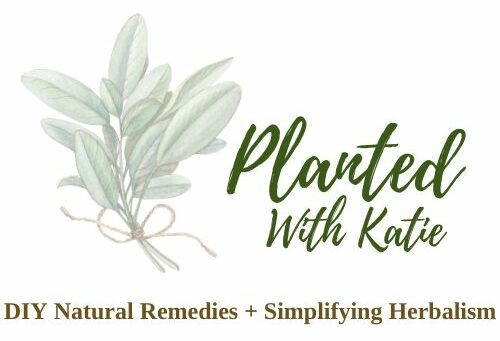Herbal Tea For Allergies (Seasonal Allergy Relief)
Spring and fall bring beautiful colors and foliage... and for some it also brings seasonal allergies. Herbal Tea For Allergies can be a potent natural remedy for the symptoms that come with more pollen in the air.

Disclaimer: This is not medical advice. Information and statements shown here are for educational and informational purposes only and are not to replace the advice of your healthcare professional.
This post may include affiliate links. Please refer to our disclaimer for full disclosure.
When spring and early fall come around, many people start sneezing, itching their eyes, and getting sore throats. This happens because of seasonal allergies.
These allergies are our body's way of reacting to tiny parts from plants, like pollen from flowers, trees, and grass. These tiny parts float in the air, especially when plants start to bloom in spring or when leaves fall in early fall.
Herbal Tea For Allergies
Allergy sufferers look for ways to feel better when allergies hit. Some take medicine from the store, and others might visit a doctor for help. But there are also simple, natural remedies to help soothe these annoying symptoms—herbal teas.

Herbal tea is a drink made from plants and herbs. It's been used for a very long time to help with all sorts of health problems, including the annoying stuff that happens because of seasonal allergies.
The medicinal properties of herbal tea cannot be ignored, especially when it comes to fighting seasonal allergy symptoms. Let's use the goodness of plants to help mitigate spring allergies.
Common Symptoms of Seasonal Allergies
Seasonal allergies, also known as hay fever or allergic rhinitis, can bring about a host of uncomfortable symptoms that vary from person to person. These symptoms are the body's response to allergens such as pollen, mold, and pet dander, which are more prevalent during certain times of the year, especially in spring, summer, and early fall. Here are some of the most common symptoms associated with seasonal allergies:

- Sneezing: One of the most recognizable signs of seasonal allergies, frequent sneezing is a direct response to the irritation of the nasal passages caused by allergens in the air.
- Runny or Stuffy Nose: Allergies can lead to a runny nose with clear, thin mucus or a stuffy nose due to congestion, making it difficult to breathe comfortably through the nose.
- Itchy, Watery Eyes: Exposure to allergens often causes the eyes to become itchy, red, and watery, a condition known as allergic conjunctivitis. This happens because the eyes are trying to rid themselves of the allergens.
- Itchy Throat and Ears: The same allergens that irritate the eyes and nose can also affect the throat and ears, leading to an itchy or tickling sensation.
- Coughing: A persistent cough can develop due to irritation of the throat or postnasal drip, where mucus from the nasal passages drains down the back of the throat.
- Fatigue: Many people with seasonal allergies report feeling unusually tired, which may be due to the body's immune response to allergens or poor quality sleep caused by symptoms.
- Headaches: Allergies can trigger sinus headaches due to inflammation and congestion in the sinus passages.
- Shortness of Breath, Wheezing, or Asthma Flare-ups: For individuals with asthma, seasonal allergies can exacerbate symptoms, leading to increased difficulty breathing, wheezing, or more frequent asthma attacks.
- Skin Flare-ups: Allergies can also affect the skin, leading to conditions like eczema or hives. These skin flare-ups involve redness, itching, and sometimes swelling, as the skin reacts to allergens or the body's overall inflammatory response to them.
Understanding these symptoms is the first step in managing seasonal allergies effectively.
3 Benefits of Herbs For Allergy Relief
Imagine you have a toolbox. In this toolbox, instead of hammers and screwdrivers, you have special plants called herbs. These herbs are super helpful for when your body is dealing with allergies.
hen you have allergies, your body is trying to fight off things like pollen that it thinks are invaders. This fight can make you feel pretty miserable, with symptoms like sneezing, itchy eyes, and a runny nose.
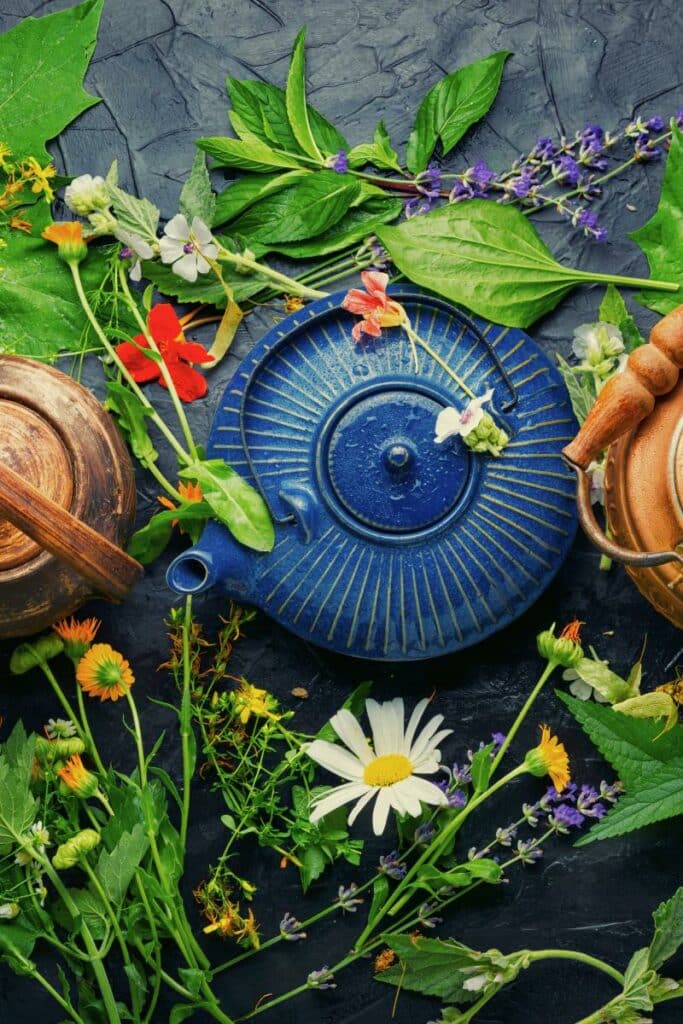
Herbs can help in a few special ways:
- Anti-inflammatory: This means they help reduce swelling and irritation in your body. When your nose gets stuffy or your eyes get puffy, it's because parts of your body are swollen. Certain herbs can help calm this swelling down, making you feel better.
- Antihistamine: Histamines are chemicals your body makes when it's reacting to allergens. They are a big reason you start sneezing and getting teary-eyed. Some herbs can naturally block or lessen these histamines, which means less sneezing and itching.
- Immune-Boosting: These herbs help your body's defense system get stronger. When your immune system is strong, it can do a better job of handling allergens without overreacting and causing allergy symptoms.
By using herbs that have these powers, you're helping your body in a natural and gentle way. You're not just dealing with the symptoms—you're helping your body get to the root of the problem. It's like teaching your body to be a better fighter against allergens, so it doesn't have to react so strongly every time it comes across something like pollen. Herbs help your body calm down and not overreact to things like flower dust.
3 Herbal Tea Blend Recipes for Seasonal Allergy Relief
1. Nettle and Peppermint Tea
Nettle is a powerful plant known for fighting off allergy symptoms. It works as a natural antihistamine, which means it can help reduce sneezing, itching, and runny noses caused by hay fever and allergic rhinitis.
Peppermint adds a cooling effect and helps open up the nasal passages, making it easier to breathe. Together, they make a great team for easing those allergy symptoms.
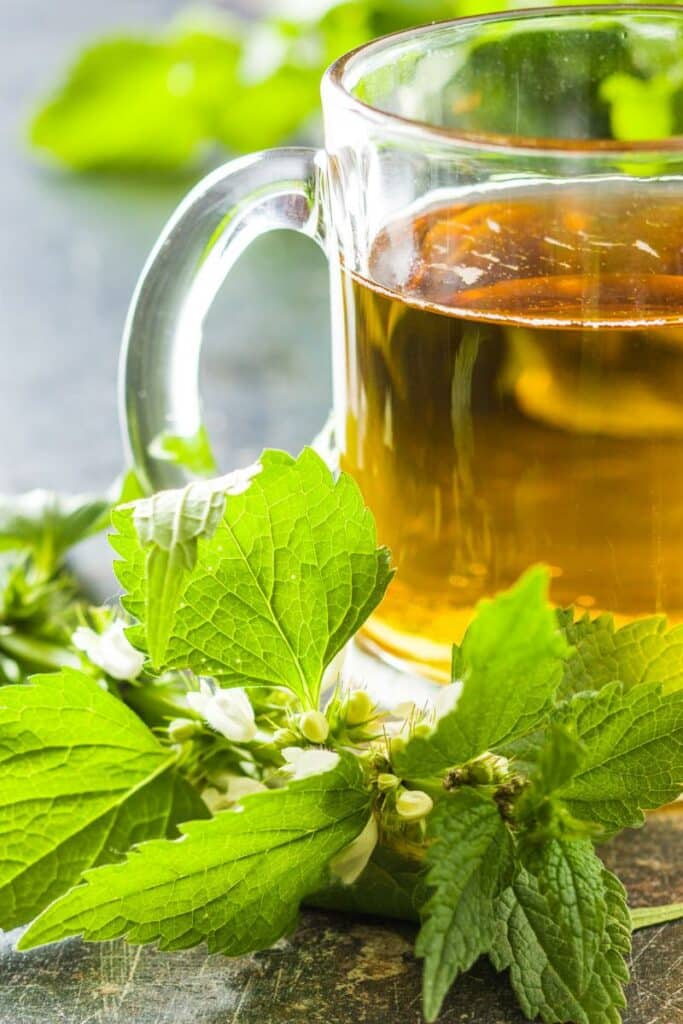
Simple Nettle and Peppermint Tea
To make this refreshing tea, take 1 teaspoon of dried organic nettle leaf and 1 teaspoon of dried organic peppermint. Put these herbs into a tea infuser or tea bag, and then place it in a cup of hot water. Let it steep for about 10 minutes. You can remove the herbs and enjoy the tea warm. If you like, you can add a little honey for sweetness.
Potent Nettle and Peppermint Tea Recipe
- Ingredients:
- 2 teaspoons of dried organic nettle leaf
- 2 teaspoons of dried organic peppermint
- Honey (optional, for sweetness)
- Instructions:
- Boil 1.5 cups of water in a kettle. Using more water and herbs than the standard recipe helps to ensure that the tea doesn't become too strong or bitter while maximizing the extraction of beneficial compounds.
- While the water is boiling, add 2 teaspoons of dried organic nettle leaf and 2 teaspoons of dried organic peppermint to a tea infuser or tea bag. If you don’t have a tea infuser or tea bag, you can simply put the herbs loose in a pot and strain them out later.
- Once the water has reached a boiling point, pour it over the herbs in the cup or pot. If you're using a pot, ensure it's covered to prevent the escape of essential oils and aromas.
- Let the tea steep for 15-20 minutes. Covering the cup or pot with a lid or a small plate helps to keep the steam and essential oils contained, which can increase the potency of the tea.
- After steeping, remove the tea infuser or strain the tea to remove the loose herbs. The result will be a more concentrated tea, with a richer flavor and potentially stronger therapeutic effects.
- Taste the tea first to gauge its strength. If you find it too strong, you can dilute it with a little more hot water until it suits your taste. If desired, add honey to sweeten the tea. Honey not only adds sweetness but also offers its own throat-soothing properties.
This more potent version of Nettle and Peppermint Tea harnesses a higher concentration of herbs and a longer steeping time to maximize the herbal benefits, making it a powerful ally against the symptoms of seasonal allergies.
The increased amounts of nettle and peppermint amplify the natural antihistamine and decongestant properties, providing more significant relief from allergy symptoms such as sneezing, congestion, and itchy eyes. Enjoy this stronger brew during peak allergy times to help manage your symptoms more effectively.
2. Ginger and Turmeric Tea
Ginger, with its robust anti-inflammatory properties, offers significant relief from the bodily reactions caused by allergens. Ginger tea helps in reducing the swelling and discomfort associated with allergic reactions, making breathing easier and reducing the severity of symptoms such as a stuffy nose and sore throat.
Turmeric, enriched with curcumin, not only complements ginger in fighting inflammation but also strengthens the immune system. This dynamic duo in a cup makes for a potent remedy that can alleviate the discomfort caused by allergies, helping you to breathe easier and feel less swollen and irritated.
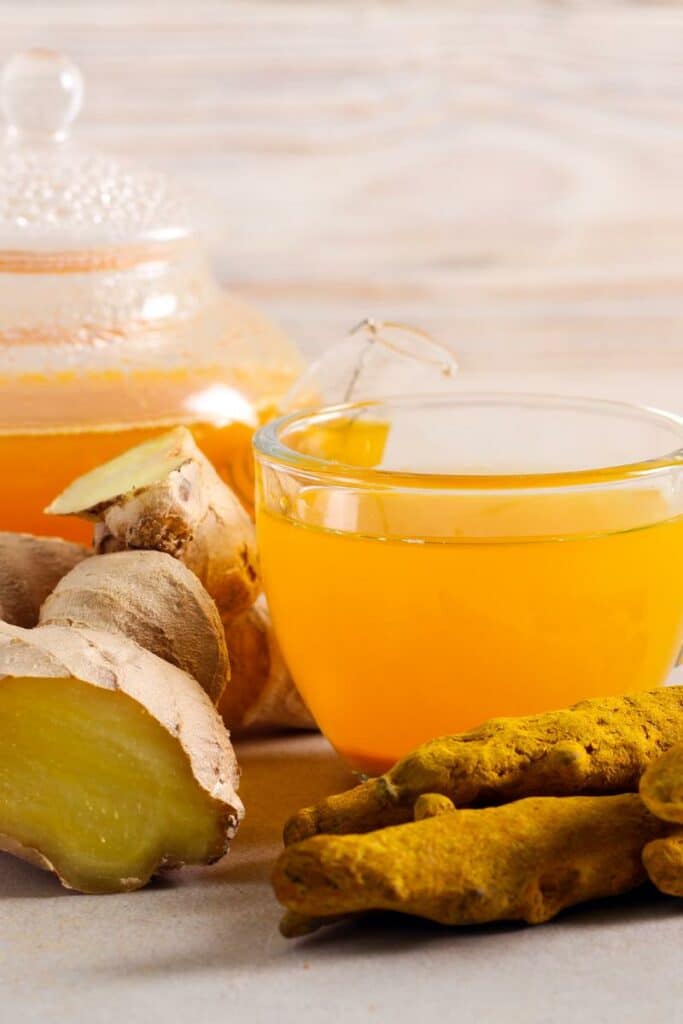
Simple Ginger and Turmeric Tea Recipe
For a spicy, warm tea that fights against allergy symptoms, start by taking a small piece of organic ginger root (about an inch long) and a similar-sized piece of turmeric root. Peel both roots and then either slice them thinly or grate them. Place these slices or gratings into a pot of boiling water and let the mixture simmer gently for about 10 minutes. After simmering, strain the tea into your favorite cup. For an added touch of flavor and additional health benefits, squeeze in some lemon juice and stir in a bit of honey according to your taste.
Potent Ginger and Turmeric Tea Recipe
- Ingredients:
- A larger piece of organic ginger root (about 2 inches long)
- A similar-sized piece of turmeric root
- Lemon juice (optional, for added flavor and Vitamin C)
- Honey (optional, for sweetness)
- Instructions:
- Begin by boiling 2 cups of water in a kettle to allow for a stronger infusion.
- While waiting for the water to boil, peel and then grate or finely chop the ginger and turmeric roots to maximize their surface area and thereby the extraction of their beneficial compounds.
- Add the ginger and turmeric directly to the boiling water and reduce the heat. Let it simmer for 15-20 minutes to allow a deeper infusion of the flavors and properties.
- Strain the tea into a large mug or two cups, ensuring that all the bits of ginger and turmeric are removed, leaving a clear, potent brew.
- If the tea's strength is overwhelming, you can add more hot water to dilute it to your preference. Enhance the taste and health benefits by adding lemon juice and honey to your liking.
This enhanced version of Ginger and Turmeric Tea offers an even more powerful approach to managing allergy symptoms. With its higher concentration of ginger and turmeric, this tea provides an intensified anti-inflammatory effect and immune system boost, offering stronger relief from the discomfort of allergies.
3. Chamomile and Licorice Root Tea
Chamomile is renowned for its ability to calm the mind and body, providing a sense of relaxation that is especially welcome when dealing with the irritations of allergy season. It's particularly effective for soothing itchy eyes and sore throats, offering a natural way to alleviate some of the most bothersome allergy symptoms.
Licorice root complements chamomile beautifully, with its sweet flavor and glycyrrhizic acid content, which has been shown to ease throat irritation and reduce coughing. Together, these herbs create a tea that not only tastes delightful but also provides genuine relief from the discomforts associated with allergies, making it an ideal choice for those seeking to unwind and soothe their symptoms naturally.
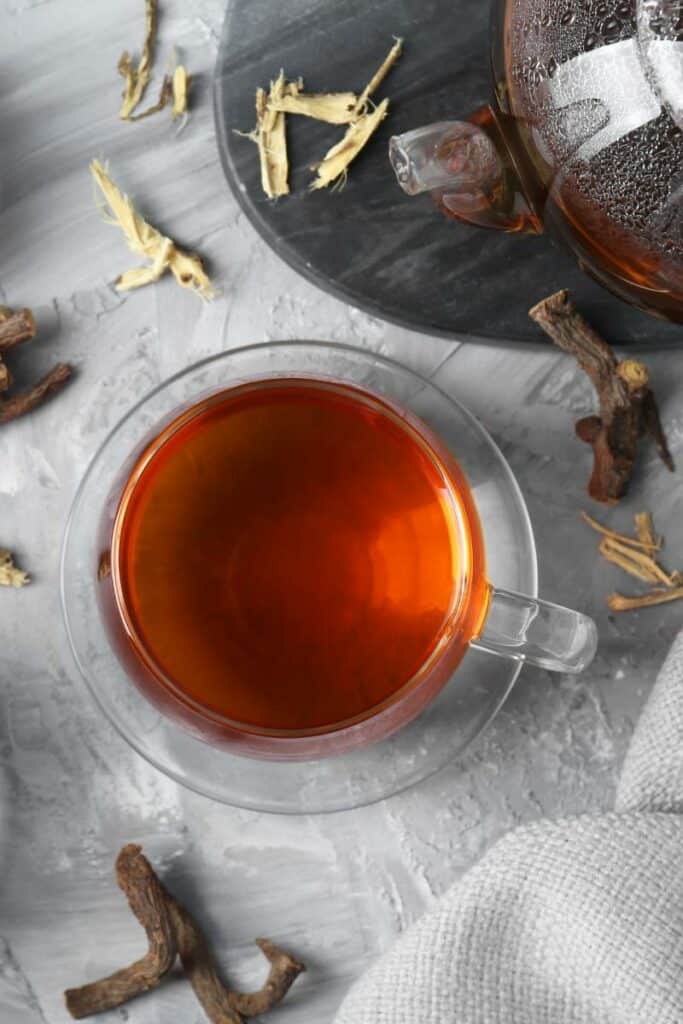
Simple Chamomile and Licorice Root Tea Recipe:
Begin with 1 teaspoon of dried chamomile flowers and 1 teaspoon of chopped organic licorice root. Combine these herbs in a cup, then pour boiling water over them. Let the mixture steep for about 10 minutes, allowing the water to become infused with the herbs' soothing qualities. After steeping, strain the mixture into a fresh cup to remove the herbs, leaving you with a clear, calming tea. If desired, enhance the tea's natural sweetness with a spoonful of honey, adjusting to suit your taste.
Potent Chamomile and Licorice Tea Recipe
- Ingredients:
- 2 teaspoons of dried chamomile flowers
- 2 teaspoons of chopped organic licorice root
- Honey (optional, for added sweetness)
- Instructions:
- Heat 2 cups of water in a kettle to a boil, preparing more liquid than the simple recipe to ensure a strong, potent brew.
- Place the increased amounts of chamomile flowers and licorice root into a tea infuser, tea bag, or directly into a pot. If you're using a pot, you'll strain the mixture later.
- Once the water is boiling, pour it over the chamomile and licorice in the container of your choice. If using a pot, cover it to prevent the escape of the herbs' essential oils, which contribute to the tea's therapeutic effects.
- Allow the tea to steep for 15-20 minutes. The extended steeping time helps to extract a higher concentration of the soothing compounds from the herbs, resulting in a more potent tea.
- Strain the tea into a large mug, or divide it between two cups if you're sharing or prefer a less intense flavor. If the tea is too strong, simply add more hot water until it reaches your desired potency.
- Sweeten with honey to taste, not only to add sweetness but also to enhance the tea's soothing effect on the throat.
This more concentrated version of Chamomile and Licorice Root Tea amplifies the soothing and calming effects of the herbs, making it an even more effective ally against the symptoms of seasonal allergies. With its enhanced potency, this tea is perfect for those seeking deeper relief from itchy eyes, sore throats, and other allergic discomforts. Sipping this tea can become a cherished ritual, providing solace and comfort during allergy season and beyond.
Each of these tea blends offers a unique combination of flavors and health benefits, making them great additions to your routine during allergy season. By incorporating these teas into your daily routine, you can enjoy a natural and delicious way to combat the uncomfortable symptoms of seasonal allergies.

Conclusion
Embracing herbal teas as a remedy for seasonal allergies not only offers relief from the common symptoms but also enhances your quality of life during peak allergy seasons.
By integrating these powerful herbal remedies into your daily routine, you invite natural, effective allergy symptom relief. Encourage trying these natural blends to experience firsthand the benefits of herbal tea for allergy relief.
Sources:
- Human studies have shown the efficacy of nettle (Urtica dioica) in reducing hay fever symptoms by acting as a natural antihistamine (Roschek et al., 2009).
- Research highlights ginger's role in immune response modulation and its anti-inflammatory benefits (Grzanna et al., 2005).
- A study on chamomile tea revealed its potential in improving allergic symptoms, thanks to its antioxidant and anti-inflammatory properties (Srivastava et al., 2010).
- Licorice root's effectiveness in allergy relief is supported by its historical use in traditional Chinese medicine and modern research on glycyrrhizic acid (Asl & Hosseinzadeh, 2008).
